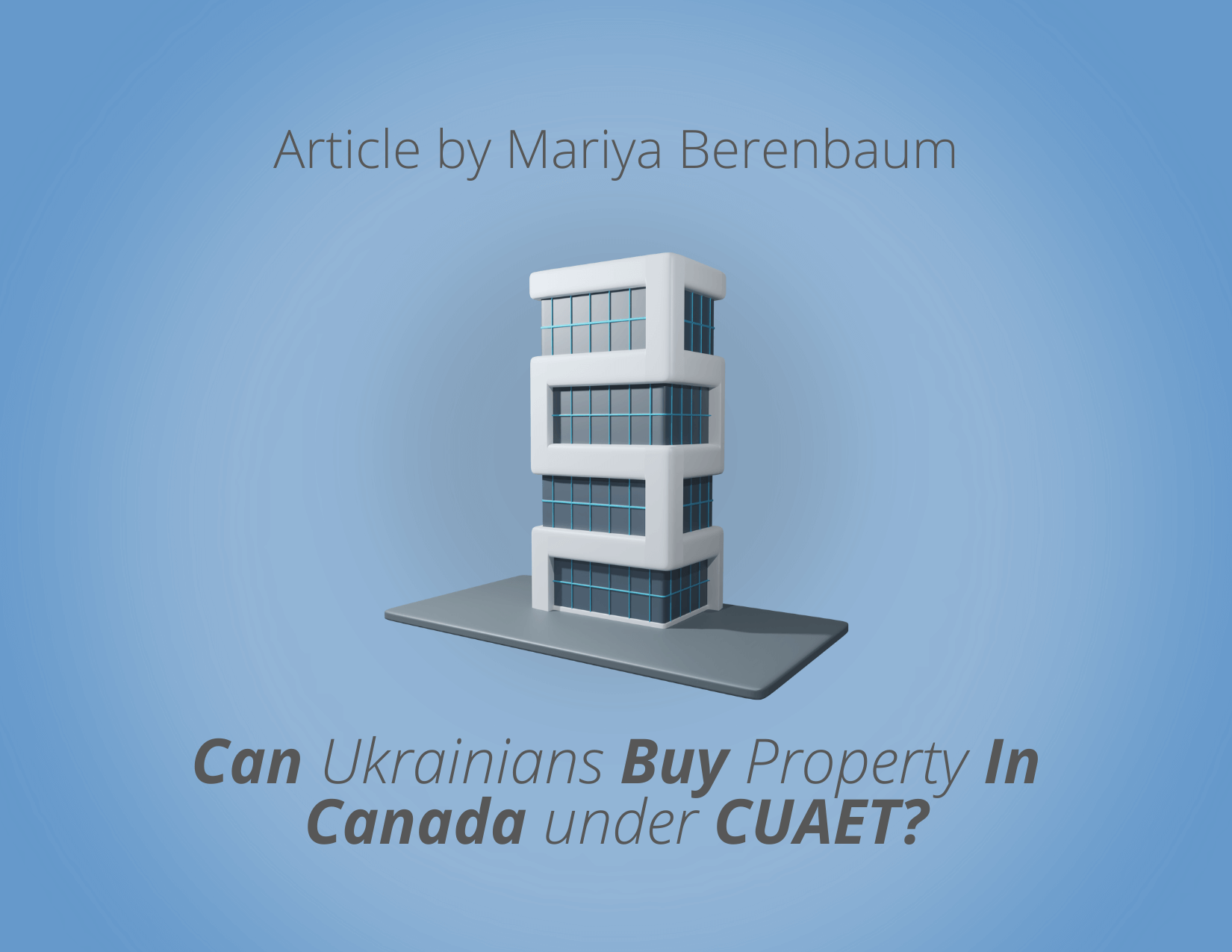Recently there has been a lot of debate about whether a person who has come to Canada under a CUAET program would be granted the right to purchases property in Ontario and further, would that person be exempt from payment of Non Resident Sales Tax (NRST). This article aims to clarify these issues by consulting governmental publications and other reputable resources. Our discussion will center specifically on the real estate market in Ontario.
What Is CUAET?
Introduced in March 2022, the Canadian government initiated an emergency travel program to provide Ukrainian nationals an opportunity to work, study, and reside in Canada until it becomes safe for them to go back to Ukraine. The application window for this program closed recently, on July 15, 2023. To date, over 850,000 CUAET applications* have been approved, and a significant number of these individuals have chosen Ontario as their new residence. Some may even be considering making Ontario their permanent home by investing in real estate, but they could face certain legal obstacles under existing laws.
What Is NRST?
NRST stands for Non-Resident Speculation Tax. Effective January 1, 2023 to December 31, 2024, the Government of Canada has implemented a prohibition on the purchase of certain residential property in Canada by non-Canadians. The prohibition operates separately from Ontario’s Non-Resident Speculation Tax. NRST is payable unless all the requirements for an exemption under federal as well as provincial government are met.
NRST applies to Foreign nationals or taxable trustees who purchase or acquire residential property in Ontario. Taxable trustee refers to either a trust with at least one trustee who is a foreign entity or a trust with no foreign trustees but a beneficiary of the trust is a foreign entity. The current rate of NRST is 25% of the value of consideration and the tax is applicable to all residential real estate transactions with some narrow exceptions.
Properties that are not subject to NRST:
● Residential properties that contain 7 or more units.
● Properties designated as farms under the Assessment Act.
● Agricultural, Commercial and Industrial Properties.
NRST applies to Foreign nationals or taxable trustees who purchase or acquire residential property in Ontario. Taxable trustee refers to either a trust with at least one trustee who is a foreign entity or a trust with no foreign trustees but a beneficiary of the trust is a foreign entity. The current rate of NRST is 25% of the value of consideration and the tax is applicable to all residential real estate transactions with some narrow exceptions.
Properties that are not subject to NRST:
● Residential properties that contain 7 or more units.
● Properties designated as farms under the Assessment Act.
● Agricultural, Commercial and Industrial Properties.
Is It Possible For Individuals In Canada Under The CUAET program To Purchase Property In Ontario?
The short answer is yes**. Individuals who have come to Canada under the CUAET program, having received temporary resident status on humanitarian grounds in accordance with the Immigration and Refugee Protection Act, are not barred from acquiring property. However, there are certain considerations to keep in mind, particularly when it comes to the Non-Resident Sales Tax (NRST). Despite an individual’s eligibility to buy property under the CUAET program, there are limited exemptions for NRST payments. In many cases, NRST will still be applicable, even if only one of the property buyers is a foreign national. In such cases, NRST is levied on the entire value of the property.
Who Qualifies for an NRST Exemption?
● Nominees: Foreign nationals who are part of the Ontario Immigrant Nominee Program at the time of purchase may be eligible for an NRST exemption, provided they have applied or will apply to become a Permanent Resident of Canada.
● Protected Persons: Those who have been granted refugee status under section 95 of the Immigration and Refugee Protection Act (Canada) at the time of the property purchase may also be exempt. It’s important to clarify that a CUAET visa is not equivalent to refugee status. Thus, unless specified otherwise, CUAET visa holders generally do not qualify for this exemption.
● Spouses: If you are the spouse of a Canadian citizen, a permanent resident, a nominee, or a protected person, you might be exempt from NRST. For the purposes of the Land Transfer Tax Act, a spouse is defined as either:
1. Two individuals who are legally married to each other, or
2. Two individuals who have cohabited either continuously for a minimum of three years or are in a relationship of some permanence and share a child, either biologically or through adoption.
● Protected Persons: Those who have been granted refugee status under section 95 of the Immigration and Refugee Protection Act (Canada) at the time of the property purchase may also be exempt. It’s important to clarify that a CUAET visa is not equivalent to refugee status. Thus, unless specified otherwise, CUAET visa holders generally do not qualify for this exemption.
● Spouses: If you are the spouse of a Canadian citizen, a permanent resident, a nominee, or a protected person, you might be exempt from NRST. For the purposes of the Land Transfer Tax Act, a spouse is defined as either:
1. Two individuals who are legally married to each other, or
2. Two individuals who have cohabited either continuously for a minimum of three years or are in a relationship of some permanence and share a child, either biologically or through adoption.
To qualify for an exemption, the buyer must certify that they will occupy the property as their primary residence.
Another important fact to remember that the exemption of a spouse applies only to one individual so if a Canadian citizen, permanent resident of Canada, nominee, or protected person and his or her foreign national spouse purchased the property with another foreign national who is not a nominee or protected person, NRST will be payable on 100% of consideration of the property.
Another important fact to remember that the exemption of a spouse applies only to one individual so if a Canadian citizen, permanent resident of Canada, nominee, or protected person and his or her foreign national spouse purchased the property with another foreign national who is not a nominee or protected person, NRST will be payable on 100% of consideration of the property.
NRST Rebate Guidelines: What Foreign Buyers, Including Those Under CUAET, Need To Know
As of March 29, 2022, the Non-Resident Sales Tax (NRST) rebate is no longer available for international students and foreign nationals working in Ontario. The only pathway to secure an NRST rebate now is by acquiring permanent residency in Canada. If successful, the full NRST amount can be reclaimed by the buyer.
Before buying a property, it is essential to understand the eligibility criteria for NRST rebate, as it could influence your decision to purchase.
To qualify for a rebate, buyers must meet all of the following conditions:
1. Permanent Residency: Buyers must attain permanent residency status in Canada within four years of the property purchase date. While four years may seem like a long time, Canadian immigration process is lengthy and it could jeopardize your eligibility for rebate if PR is not received within the four year deadline.
2. Timely Application: After becoming a permanent resident, applicants have 90 days to apply for the NRST rebate. Waiting for the physical Permanent Resident (PR) card is not advisable, as it is generally issued after permanent residency is granted. Missing the 90- day window will result in a rebate denial. In most instances, a letter from an immigration officer or the IRCC confirming permanent resident status suffices for rebate application.
3. Property Ownership: The property must solely be in the name of the foreign buyer and/or their spouse. Including friends or relatives as co-owners will invalidate your claim for a rebate. Even if a friend or relative is listed as a guarantor, adding their names on the title will lead to a rebate refusal.
4. Primary Residence Requirement: The property must serve as the primary residence of the foreign buyer—and their spouse, if applicable—within 60 days of the closing date. Properties purchased for investment purposes are not eligible for the rebate. It’s also worth noting that First-Time Home Buyer rebates are not available to foreign buyers. However, separate application procedures exist for those who later become permanent residents.
For CUAET program participants debating home ownership in Ontario, NRST poses a significant financial hurdle, adding an extra 25% to the purchase price. Despite this, if foreign buyers wish to proceed, it’s crucial to align this decision with their immigration goals and examine NRST rebate criteria closely. After all, navigating taxes and rebates is part of life in Canada.
Before buying a property, it is essential to understand the eligibility criteria for NRST rebate, as it could influence your decision to purchase.
To qualify for a rebate, buyers must meet all of the following conditions:
1. Permanent Residency: Buyers must attain permanent residency status in Canada within four years of the property purchase date. While four years may seem like a long time, Canadian immigration process is lengthy and it could jeopardize your eligibility for rebate if PR is not received within the four year deadline.
2. Timely Application: After becoming a permanent resident, applicants have 90 days to apply for the NRST rebate. Waiting for the physical Permanent Resident (PR) card is not advisable, as it is generally issued after permanent residency is granted. Missing the 90- day window will result in a rebate denial. In most instances, a letter from an immigration officer or the IRCC confirming permanent resident status suffices for rebate application.
3. Property Ownership: The property must solely be in the name of the foreign buyer and/or their spouse. Including friends or relatives as co-owners will invalidate your claim for a rebate. Even if a friend or relative is listed as a guarantor, adding their names on the title will lead to a rebate refusal.
4. Primary Residence Requirement: The property must serve as the primary residence of the foreign buyer—and their spouse, if applicable—within 60 days of the closing date. Properties purchased for investment purposes are not eligible for the rebate. It’s also worth noting that First-Time Home Buyer rebates are not available to foreign buyers. However, separate application procedures exist for those who later become permanent residents.
For CUAET program participants debating home ownership in Ontario, NRST poses a significant financial hurdle, adding an extra 25% to the purchase price. Despite this, if foreign buyers wish to proceed, it’s crucial to align this decision with their immigration goals and examine NRST rebate criteria closely. After all, navigating taxes and rebates is part of life in Canada.
We would like to thank Mariya Berenbaum, a lawyer with MBLAW Professional Corporation, for sharing this informative article with IK Financial. Our partnership with Mariya helps deliver personalized solutions for various real estate needs. MBLAW’s team of experienced lawyers is here to help with your residential real estate and immigration needs. Fill out the form to schedule your no-obligation consultation and take the first step toward peace of mind. Your dream home in Ontario is closer than you think. Get in touch now! Contact MBLAW Professional Corporation today for a FREE consultation.
Connect with Mariya:
Tel. 416-513-9418
Email. info@mblawpc.ca
Website. mblawpc.ca
Follow Mariya on Social Media:
IK Financial Mortgage Team operates on behalf of Mortgage Edge. Lic#10680





